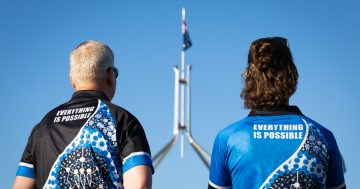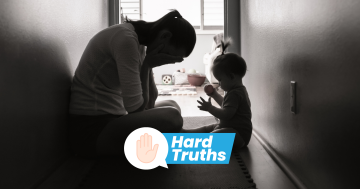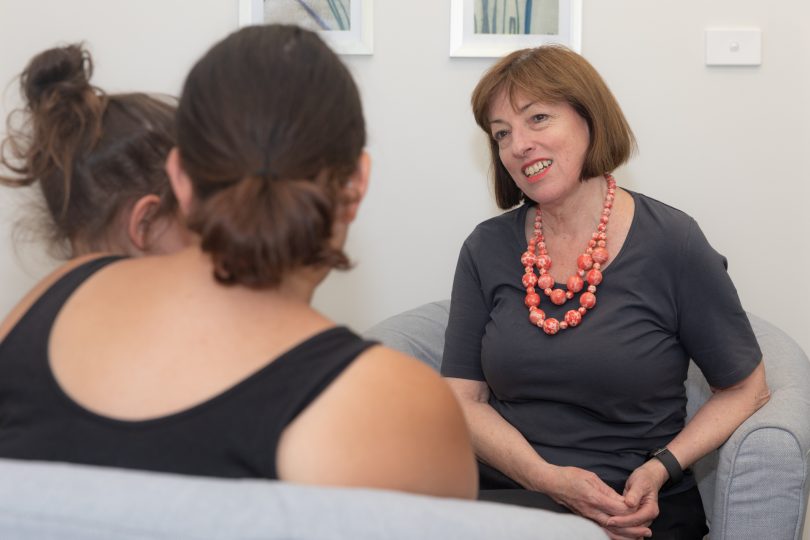
Marie-Louise Corkhill, right, is the director of Karinya House which supports vulnerable women and babies in the ACT and surrounding NSW. Photo: Michelle Kroll, Region Media.
The Domestic Violence Crisis Service has seen a 27 per cent increase in contacts in March. Menslink has had to cancel almost three-quarters of its funding activities. The Conflict Resolution Service has limited its face-to-face contact as it tries to operate in an online environment.
A similar situation is being faced by Karinya House, which offers a secure environment for women who are pregnant or parenting with newborn babies and are without appropriate support and accommodation. Animal welfare and the demand for services provided by the RSPCA in Canberra is at an all-time high.
While the ACT Government has pitched in with a $7 million community support package to provide food relief and support for vulnerable members of the Canberra community, further funds will be needed so that community organisations can continue to operate during the crisis.
As the ACT Council of Social Service (ACTCOSS) CEO Dr Emma Campbell said, the community sector is critical in the response to the COVID-19 crisis.
“It is really important that community service providers continue to be funded and supported so they can focus on providing the critical supports that the community requires now,” Dr Campbell said.
Region Media has spoken with five of the agencies at the forefront of keeping essential services in the community ticking. They all tell a similar story of increasing demand and diminishing funds.
CEO of the Domestic Violence Crisis Service Sonia Di Mezza said the Service has had to postpone or cancel important fundraising events in the face of heightened demand and reports of people who use violence and controlling behaviours in their relationships.
“How we support clients to exit our emergency accommodation is going to look very different due to a lack of access to refuges, interstate travel being more difficult, and family and friends not being as accessible as usual,” Ms Di Mezza said.
“Some of our clients are going to require access to emergency accommodation. We will continue to support people who are impacted by domestic and family violence during this time. We want to help keep people safe. That is our priority.”
Karinya House executive director Marie-Louise Corkhill said one of their challenges is working with women via phone in that it limits staff being able to notice behaviours and signs that may indicate higher levels of personal violence or other concerns, such as mental health issues.
“While they may have a mobile, their data is often very limited. Often women will access extra data via public spaces such as shops and libraries; however, these options are not currently available.”
Physical distancing restrictions also have an impact on family reunification or families where children are in shared care arrangements with another family member.
Disruptions to visits with children can have a significant impact on women and their children and Ms Corkhill said it is unclear how these arrangements will now occur.
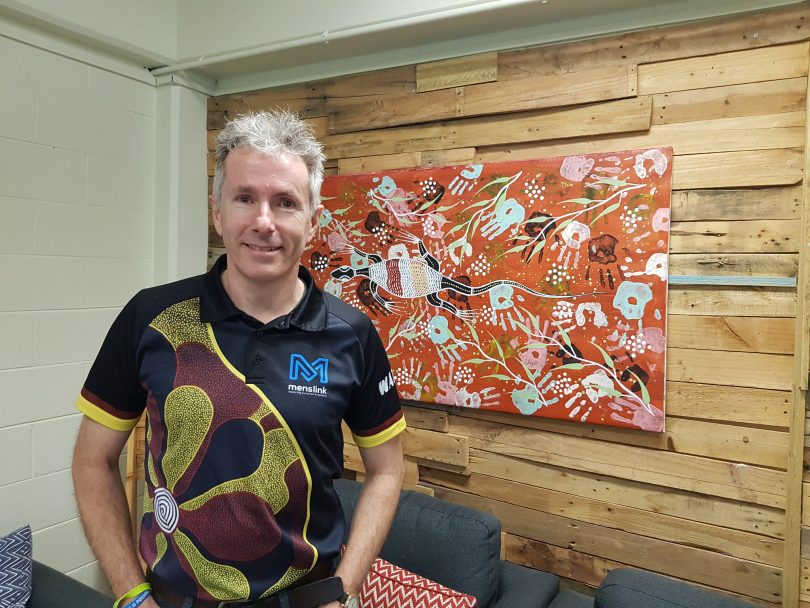
Menslink Canberra CEO Martin Fisk. Photo: Supplied.
Menslink Canberra supports the increasing needs of young men and their families in Canberra, and CEO Martin Fisk is anticipating a rise in requests for help, particularly once people get over the initial shock of social distancing laws.
“In particular, we’re likely to see a dramatic rise in the use of violence at home as families live with the stress of the lockdown, job loss and uncertainty around school,” Mr Fisk said.
“We’re adopting a range of online support options for our young guys, as we change our engagement model to meet the social distance and isolation requirements.
“The challenge is though, as strange as it sounds, that many young guys prefer face-to-face [discussions], especially when they’re grappling with really significant life challenges.”
Menslink has also seen its donations and fundraising activities fall dramatically.
“The recent Federal and Territory Government stimulus packages are much welcomed, but I suspect that we, like many in both the community and private sectors, will need more as the year progresses,” Mr Fisk said.
Conflict Resolution Service CEO Mel Haley said their challenge is continuing to support young people as schools go pupil-free and there are fewer activities for young people to participate in.
A pilot program has been focussing on how the service works with families and ensures family conflict does not escalate during this time.
“With the pilot funding ending this June, we also need to consider how the program will function if funding is not extended,” Ms Haley said.
“We have been faced with a series of unfortunate events with bushfires, flooding and now COVID-19. Many people are feeling isolated and forced into high conflict situations.
“More concerning, family conflict is the highest contributing factor to youth homelessness and is one of two top reasons for divorces. When conflict impacts one area of a person’s life it causes emotion, financial and social disadvantage across all areas of someone’s life.”
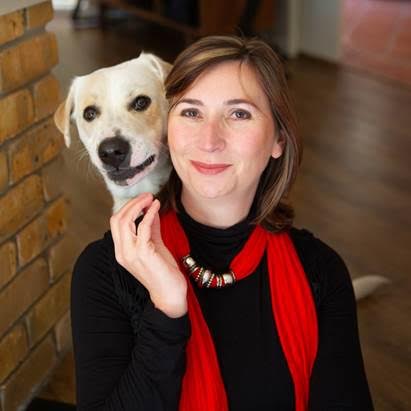
RSPCA CEO Michelle Roberston. Photo: File.
RSPCA ACT‘s CEO Michelle Roberston said, like all community organisations, they are trying to do more with less. Their annual Million Paws Walk, which provides 60 per cent of their funding, has been cancelled.
While she says pets are great for our health and wellbeing, Ms Robertson warned against adopting a pet as a short-term solution to social isolation as a pet will be with you longer than physical distancing.
“Even simple things like stroking your pet can reduce stress and anxiety and playing with your pet is likely to make you smile or laugh, which in turn also positively affects your happiness levels,” she said.
“In short, animals really do help us to better, and be healthier.”

















